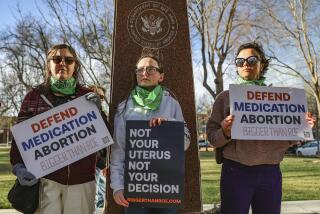Readers React: What the Hobby Lobby decision does -- and doesn’t -- say
To the editor: It is misleading to say flatly that the Supreme Court’s Hobby Lobby ruling applies to all corporations. (“Myths and spin abound on Supreme Court contraceptive decision,” July 3)
Twice the majority opinion stated its holding very simply. First: “We hold that a federal regulation’s restriction on the activities of a for-profit closely held corporation must comply with RFRA,” the Religious Freedom Restoration Act of 1993.
And at the end: “The contraceptive mandate [of the Affordable Care Act], as applied to closely held corporations, violates RFRA.” The opinion explicitly denies making any ruling about publicly traded corporations.
True, some of the majority’s reasoning might be used to extend the holding to larger corporations, but that is not what the court held. Some of the reasoning might preclude such an extension.
For example, the majority observes that “numerous practical restraints would likely prevent” a publicly traded corporation from asserting religious freedom rights under RFRA. The opinion finds it “improbable” that “unrelated shareholders” or “institutional investors” would run a corporation under an agreed set of religious beliefs.
Those facts could easily result in a future ruling that a religious liberty claim by a publicly traded corporation is not sincere, which would defeat the claim.
Ira Spiro, Los Angeles
The writer, an attorney, teaches constitutional law at People’s College of Law.
..
To the editor: Reporter David Lauter, like a letter writer the day before, suggests that the Hobby Lobby ruling is somehow relevant to The Times’ 1st Amendment protection.
In response to the question, “How can the Supreme Court say that corporations are ‘persons’ with rights?,” Lauter writes, “This news organization, for example, [is] a corporation, but few people would argue that its corporate status prevents it from being covered by the 1st Amendment.”
The letter writer of the previous day, Jonathan Imbody of the Christian Medical Assn., asserted that “if the 1st Amendment did not apply to companies, The Times would have no right to free speech.”
But The Times’ 1st Amendment protections have nothing to do with its status as a corporation or as a person. The 1st Amendment, in addition to guaranteeing freedom of religion and freedom of speech, explicitly guarantees freedom of the press: “Congress shall make no law respecting an establishment of religion, or prohibiting the free exercise thereof; or abridging the freedom of speech, or of the press.”
Ronald McIntyre, Northridge
..
To the editor: I wonder if Hobby Lobby and other employers that wish to be exempt from the contraception mandate on religious grounds are covering Viagra and Cialis.
Lauren Siadek, Hawthorne
More to Read
A cure for the common opinion
Get thought-provoking perspectives with our weekly newsletter.
You may occasionally receive promotional content from the Los Angeles Times.










